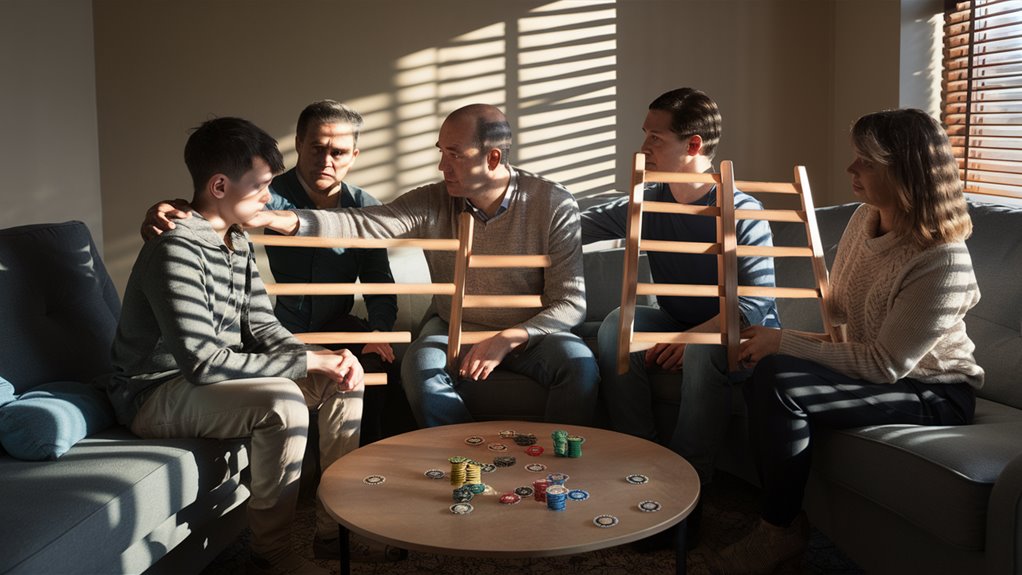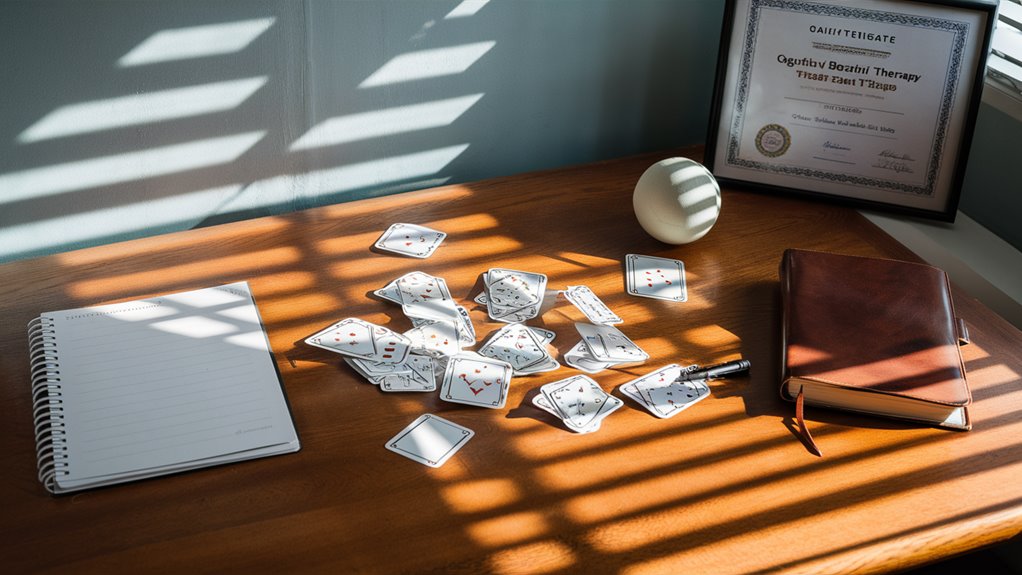
How to Deal with Gambling Habits

Reliable Ways to Handle Them
Mental care steps towards handling gambling rely on many sure ways working together to get the best healing results. Thought and Action Change Therapy (CBT) is key, aiming to fix and change harmful thought ways and actions tied to risky gambling.
Healing Steps and Their Results
Thought-focus methods show great success, with studies seeing a 30% drop in going back to old ways through better knowing of what sets off these acts. Having group help from others like Gamblers Anonymous gives needed group back up and checks.
Full Healing Plan
Healing does well with a mix of methods:
- Family talk therapy to look into patterns over generations
- Ways to boost the want for personal change
- Custom plans to manage specific triggers
- Help bonds to keep recovery going
- Proven ways to stop falling back
Healing Routes and Changing Actions
The good mix of these mental health steps leads to strong ways to heal. By using thinking changes, action changes, and group help, people build lasting skills to stop gambling and maintain good change.
Getting to Know Thought and Action Change Therapy
Learning About Thought and Action Change Therapy for Gambling Habits
The Starting Points of CBT Care
Thought and Action Change Therapy (CBT) plays a big role in fighting gambling habits through exact ways to spot and fix bad thought actions and habits.
This proven way lets people see their gambling set offs and make strong ways to deal with them. The care focuses on changing bad thoughts on gambling, like the misbelief in control or the bet taker’s mistake.
Set Ways in CBT and How to Use Them
Care tools in CBT include exact thought note-taking and act tests, showing clear links between thoughts, feelings, and gambling needs.
The gambling record is a key following tool, writing down set offs, bet ways, and feelings. This whole tracking system gives key data for making custom healing moves.
Proven Recovery Moves
Research-backed care in the CBT frame includes:
- Calm exercises
- Mind-focus moves
- Problem-fixing ways
- Plan to stop falling back
These parts work together to lower gambling often and how bad it is. The care replaces bad behaviors with good ones while making a strong help group. Through the planned use and back up, CBT brings lasting behavior changes that aid strong healing from gambling habits.
Care Results and Long-Lasting Success
Clinical proof shows that when done right, CBT greatly lowers gambling badness and aids continued healing. The mix of thought changes and action changes gives a full way to handle gambling disorder, leading to better results in both short and long healing times.
Group Help and Sharing Healing
Group Help and Sharing Programs for Gambling Healing
The Strength of Group Healing in Handling Gambling
Help groups and sharing healing programs act as core parts in full care of gambling habits, giving unique care gains that boost expert steps.
Gamblers Anonymous (GA) and other groups give set frames where people share experiences, ways, and hard times with peers who really get their path.
Key Gains of Sharing Help Networks
Sharing recovery help gives three key perks in gambling care:
- Drops being alone: Makes a helpful group place where people connect with others facing the same hard times
- Healing Role Models: Gives real proof of successful healing stories, showing change can happen
- Help Each Other Gains: Lets recovering gamblers boost their own healing by helping others
Proven Help Systems
Research-backed recovery groups keep clear lines and set ways while letting ways to join change.
Online help groups have come up as very good choices, helping those with:
- Place limits
- Time limits
- Moving limits
- Need for privacy
Maxing Out Healing Success
Regular joining and steady joining link right with better healing results. When mixed with expert therapy, sharing help groups greatly boost:
- Long-run healing rates
- Ways to stop falling back
- Building coping skills
- Help group strength
The mix of set group help and expert care makes a full healing frame that deals with both now and long-run rehab needs.
Mind-Focus Care Ways
Mind-Focus Care Ways for Gambling Healing

Proven Mind-Focus Moves
Mind-focus exercises have come up as strong moves in handling gambling habits, letting people break from compulsive acts.
These skills grow better knowing of gambling set offs and feeling states, pushing thoughtful ways over fast reactions.
Clinical Study and Care Results
Mind-focus thought care (MBCT) shows good work in easing gambling wants through non-judging watch of thoughts. This way helps members see the short life of wants and builds skills to last to beat them.
Studies confirm that steady mind-focus practice cuts anxiety and sad feelings often seen with gambling disorders 호치민 KTV
Putting Mind-Focus Ways to Work
Core mind practices
- Breath knowing moves (5-10 minutes every day)
- Body checking ways
- Mindful watch of gambling-linked thoughts
- Early sign finding through better self-knowing
Joining Care and Success Rates
Studies show that adding mind-focus strategies with usual therapy can greatly boost care results. Reports show up to 30% drop in going back to old ways among members who keep up regular mind-focus practices with old care ways.
The set use of these proven mind-focus moves builds a challenges of karaoke strong base for continued healing and better mind health results in handling gambling habits.
Family Ways in Therapy
Family Ways in Therapy for Gambling Habits
Knowing the Wide Impact of Gambling
Family systems therapy looks into gambling habits by studying the complex web of relations and behavior ways within the whole family group.
Problem gambling doesn’t stand alone but acts as both a sign and pusher of family trouble, touching many generations and how they relate.
Key Therapy Moves
System-wide help focuses on spotting key ways including:
- Helping behaviors
- Shared need patterns
- Pains carried over generations
- How the family talks
- Who holds power
- Rules not talked about
Care Moves and Steps
The therapy work takes in many proven approaches:
Family Rebuilding
- Setting healthy lines
- Making clear talk ways
- Talent Shows, and More
- Putting in place good coping skills
- Building check structures
Clinical Moves
- Family drawing tasks
- Role-play therapy times
- Line-setting skills
- Talking skills training
Healing Results and Gains
Study shows that family-based care really boosts healing results when:
- Family joins in therapy
- Clear lines and limits are set
- Supportive links are kept
- Wide changes are made across the family group
Putting Care to Work
The healing work mixes:
- Regular family therapy times
- Individual talking parts
- Group help ways
- Act change skills
- Crisis help ways
This full way makes sure lasting healing through continued family system changes and support.
Boosting Motivation Ways
Ways to Boost Motivation in Addiction Recovery
Getting to Know Motivation Boosting Therapy (MET)
Motivation Boosting Therapy stands as a key move for handling gambling and substance issues.
This proven approach helps clients use their inner drive for change, making lasting healing paths without leaning on outside pushes.
Core Ideas and How to Use Them
MET’s work rests on four main ideas:
- Show understanding through healing ties
- Grow gaps between now acts and personal values
- Go with push backs rather than fighting them
- Back self-belief for lasting change
Advanced Healing Moves
Pros use specialized motivation talks, including:
- Open talks
- Listening back
- Smart praise
- Change talk growing
Joining Clinical Care and Results
Study shows that mixing MET with other proven treatments greatly boosts:
- Staying in treatment rates
- Long-term healing results
- Client joining levels
- Success in changing behaviors
Proven Results
Research keeps showing that clients getting MET-based help reach:
- Better healing ties
- More following with treatment
- Stronger wish to change
- Better handling of unsure feelings
- Lasting behavior changes
These results especially help those who before had a hard time with direct fighting ways, making MET a needed tool in today’s addiction care ways.
Plan to Stop Falling Back
Full Plan to Stop Falling Back in Gambling Recovery
Knowing the Key Parts of Stopping Falling Back
Good falling back stopping in gambling recovery rests on three main parts: spotting set offs, making coping plans, and making help links.
These parts work together to make a strong guard against possible steps back in recovery.
Spotting Personal Set Offs
Gambling set offs show up in many ways:
- Feeling set offs: Stress, worry, sad feelings, or dull moments
- Outside hints: Casino ads, sports bet ads
- Place-based factors: Money pressures, social times, or certain locations
- Digital set offs: Online game sites, bet apps alerts
Making Plans to Cope
Fast Answer Plans
- Mind-focus skills and quiet sits
- Body acts
- Other reward acts
- Money lines and safety steps
Long-Lasting Stop Ways
- Act change skills
- Stress handle moves
- Healthy life choices
- Money plans and checks
Making and Keeping Help Links
Pros in Support
- Licensed helpers for gambling issues
- Money helpers for cash care
- Care plans and talk times
Personal Help Systems
- Family and friends as check pals
- Joining recovery groups
- Help call lines
- Peer help groups
Watching and Changing Plans
- Steady check on progress
- Plan changes based on how well they work
- Keeping track of set offs
- Celebrating key recovery times
- Keeping help links going
This set way makes sure full care for keeping long-term healing success while looking after possible falling back risks actively.



